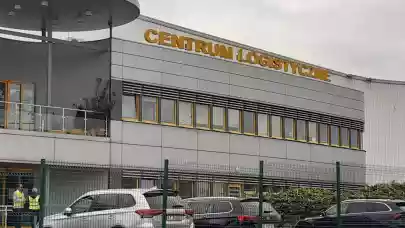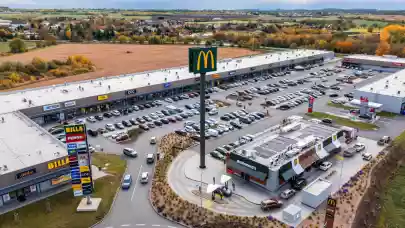
Real estate development is a long-term venture where the end results (including profitability) are often unpredictable, especially in the current challenging global environment. Property Forum talked to Norbert Schőmer MRICS, Country Director at Atenor Hungary and the recently appointed Chairman of RICS in Hungary, covering the topics of ESG, changes in the office market, affordable housing and education, among others. He also provided an update on Atenor’s ongoing projects in Hungary and shared his priorities as RICS Chairman.
Congratulations on your new role as Chairman of RICS in Hungary. What would you say are your main priorities in this new role?
Thank you. It's definitely a privilege, but also a huge responsibility. We are living in very challenging times, not only globally, but locally in Hungary too, because of the economic, political and environmental uncertainties. The most difficult issue to solve for our industry is probably sustainability, more particularly to find ways to decrease pollution. Our industry is undergoing a wide transformation, not only in terms of how we create our products but also in terms of how we use them, what is the current demand and what will be required in the next decades or even centuries. In the office, retail and logistics sectors, we see tremendous changes in demand. Our industry is responsible for answering those changes and coming up with answers which are complex and sustainable, both in terms of environmental and social impacts.

Norbert Schőmer
Country Director
Atenor Hungary
What are some of the answers RICS can offer to the industry for overcoming these challenges?
With the built environment estimated to be responsible for around 40% of global carbon emissions, RICS is working with members and key stakeholders across the built and natural environment to ensure we collectively reduce our carbon consumption across different lifecycles.
But what you cannot measure, you cannot control. Using the RICS whole-life carbon assessment standard, you can actually estimate the amount of carbon emitted throughout the life cycle of a constructed asset, from the early stages of design development through to the end of life. It gives visibility to embodied carbon, operational carbon, and user carbon – something that is vital to carbon calculations and a unique feature of the RICS standard. By giving visibility to the carbon cost of different design choices, the standard aims to help manage carbon budgets, reduce lifetime emissions and deliver a net-zero future for the built environment.
Talking about some of the other challenges in the industry, incorporating ESG requirements into valuations is one of those. Here too, the “what you cannot measure, you cannot control” is a main driver. Market players will need to come to an agreement as to what data is collected, who is responsible for collecting and providing the data, and how that data is being used ultimately. All that in a consistent and transparent way.
RICS has recently introduced one potential tool to advance these efforts. The Data List contains 12 indicators that valuers and their (financial) clients are asked to take into consideration when undertaking a valuation. Data may not (yet) be available everywhere, which is why the data list follows the 'comply or explain' principle. Next to the 12 'core' indicators, there is a second list of future potential indicators, to make valuers and clients aware of what we believe is up and coming and may be included in the core indicator list in future updates.
This is a truly industry-wide initiative with valuation service providers, investors, banks, and other important associations coming together for a more sustainable, inclusive and resilient built environment.
Moving on from standards to everyday execution, you work for a multinational company which obviously has an ESG strategy at the group level. How are you approaching the topic at Atenor?
Atenor is a company that not only builds green buildings but is also financing them with green bonds. It has been an evolution for us – for example, starting with BREEAM certification, how to get from ‘Good’ to ‘Excellent’ level. Besides BREEAM, we also build complexes with WELL certifications, which not only reflect our answer to environmental challenges but also to social ones and equality issues. Last but not least, we have started to conform with the EU Taxonomy standards. We have a very ambitious goal to achieve the 2030 requirements by the end of 2026. It's an enormous job, we have a separate daughter company in our organization in Europe, which is working tirelessly only on sustainability issues. So corporate level is one thing, and aligning with standards - is a similar one. But I think the most important part here is the participation and mentality of the people and the whole industry. And that's where RICS has a major role to play. It’s not enough to tick the boxes, we have to reach a mentality shift across all segments of the market.
For a mentality shift to be achieved, dialogue is needed between different market players. Do you see that there is a setting for that in Hungary? This is obviously also something where RICS can play an important role.
I don't think that there is a very good dialogue on environmental issues between market players and stakeholders in Hungary. There is no good platform where the stakeholders can communicate, especially regarding the long-term future planning on this issue. I don't see any coordination or any pressure among developers to achieve common sustainability goals. I think that 80% of the developers have realized that they have to comply with standards like BREEAM or the EU Taxonomy and maybe they try to do a little bit more in one or two fields. But there is no coordination and no common approach. And I think RICS has a role in changing that state of affairs.
Let's dive into the office market which is where your background is. There is almost no development activity in Budapest, but some demand is still there. How do you see it?
There is definitely a substantial drop in demand, not only due to COVID-19, but also due to new ways of working, transportation challenges, etc. At the same time, in the last 10-12 months, the market has come to the realisation that the office is still needed. Some of the companies which have given up on their office locations now realize that they need a place where they can motivate their team and get together. So that's a different kind of demand than what we had experienced five years ago, but it is present and the developers have to answer it. In terms of quantity, it's a smaller demand, but in terms of quality, it's a higher one. If you look at the rents in the top office projects in Budapest or anywhere around the world, they didn't fall. That means that some of the companies for whom this “office as a team motivation centre” is important are still ready to pay top dollar for having their headquarters or uniting spaces in one location.
With this realisation in mind, do you see an opportunity for rental growth?
I can see the potential for rental growth but only on a very gradual level. As the economy grows, I think we will see that the prime rental levels will grow as well. But we also have to see that the Budapest office market now is 4.3 million square meters with a rather unhealthy vacancy rate of 13-16%.
If you look at the market, you’ll realize that top-quality products have a vacancy of only 6-8%, while the rest – such as suburban markets with low-quality products – have a 30% vacancy. And I think in terms of high vacancy products, there must be a solution: not always refurbishment but potentially conversion to other functions – residential, hospitality, educational, medical or even technical. Noticeably the worst office building in Budapest still has a better quality than the best hospital. How is it possible that society is using an office building with just a 60% occupation rate while in any given school, you won't find space for an extra class? There is an anomaly and I think both the regulators and the private sectors have to think about balancing this serious surplus-shortage controversy.
Atenor is now finishing two office projects in Budapest. How are those progressing? What’s next after they’re done?
We are finishing the headquarters of E.ON which is phase one of our BakerStreet project. It's a 16,000 sqm GLA building leased to a single tenant. We also have the 20,000 sqm phase 2 in the pipeline with a secured building permit and a construction design. We have to change it a bit to achieve the EU Taxonomy upgraded level so we have still to work for another 5-6 months and then we would be able to start construction. Whether we do it or not – it's up to the market conditions.
We have another office development, Arena Business Campus, which we started building more than three years ago. We completed one building which is only 35% leased yet, so if somebody needs a new, modern office space, we can still offer it on the market. But we are looking at other opportunities.
Our flagship project now is our residential development, Lake 11 which is very sustainable and probably one of the most popular products in the Hungarian residential market right now. Altogether we have 16 plots, where we plan to build 900 apartments, complemented by a playground, a running track, a dog running track, a pedestrian area, and a kindergarten, together with the refurbishment and cleaning of the adjacent lake. Now we are building the first phase with 265 apartments, half of which already sold. Handovers will start at the beginning of the summer, and we plan to hand over the last apartment in December this year.
Since we’re talking about the residential market, affordable housing is a topic that's been discussed all over Europe in the recent period, but not so much in Hungary. What do you think should be the next step here?
Rental apartment complexes are popular among tenants as well as among investors in many Western European countries. Unfortunately, I don't see any trace of that kind of approach in CEE yet except in Poland, where legislation changed recently, but I think we'll get there soon locally too because that's a civilized way of further improving social mobility and our cities too. From the ESG perspective, affordable housing is definitely “S” but also “G” because you cannot do this without very clear and objective regulation.
In Hungary, social housing has never been seriously planned and executed in the past decades. We only saw a very low number of municipality approaches and trials. But I think social housing can create significant demand in the residential sector, which has its place and its role in society. For developers, it would be extremely important to have clean and motivating legislation on the subject.
One final topic I wanted to cover is education and real estate as a profession. Not many young people go into the world thinking that they want to become real estate professionals, this is usually just something that they happen to end up in. What do you think RICS and the industry in general can do to make it a more attractive profession for young people?
I think the technical education and engineering background in CEE countries is extremely strong. On the other hand, business and economic education is majorly coming from the western part of Europe. The mixture of these two systems creates, for me, real knowledge of the property industry. RICS is accommodating expertise in both of these fields. And it's one of the very few organizations which is providing this kind of possibility.
For me, real estate was the perfect combination of my architectural knowledge and ambitions with my economic diploma. However, this line of work, especially the development part, may be very tiring. It’s a job where you have to accept that you work for many years on a project before you finally see the results.
So I would encourage every young professional to come and join the real estate sector only in case they accept to work tirelessly on projects for several years. But when you have the result, then you can walk around your city and spot dozens of buildings that you had a major role in creating. And I can say that I can do that in Budapest.



